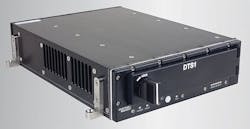Rugged data storage with NSA commercial encryption for cyber security introduced by Curtiss-Wright
By Mil & Aero staff
ASHBURN, Va. – The Curtiss-Wright Corp. Defense Solutions division in Ashburn, Va., is introducing the Data Transport System (DTS1), a commercial off-the-shelf (COTS) data storage system with support for Commercial Solutions for Classified (CSfC) two-layer encryption for cyber security and information assurance.
CSfC is a U.S. National Security Agency (NSA)-approved approach for protecting classified national security information in aerospace and defense applications using cost-effective commercial encryption technologies in a layered solution.
Curtiss-Wright supports CSfC in the company's DTS1, a rugged single-slot network attached storage device.
To help drive and widen the protection of top secret data, the NSA has approved two-layer encryption as an alternative approach to the more expensive and time-consuming Type 1 encryption for data-at-rest solutions.
Typically it can take three years and cost as much as $5 million to develop and certify an NSA top secret Type 1 encryptor. The CSfC two-layer encryption approach takes far less time and costs less, Curtiss-Wright officials say.
It uses two layers of commercially available Suite B cryptographic algorithms. System designers can develop a COTS encryption solution quickly and begin system development.
The small-form-factor SWaP-optimized DTS1 is designed to store and protect large amounts of data on helicopters, unmanned aerial vehicles (UAV), unmanned underwater vehicles (UUV), unmanned ground vehicles (UGV), and Intelligence Surveillance Reconnaissance (ISR) aircraft that require the protection of sensitive data-at-rest.
The single-slot NAS device weighs 4 pounds and measures 1.5 by 5 by 6.5 inches. It can store as much as 2 terabytes on solid-state drives (SSD). The DTS1 supports PXE protocol to enable network clients on a vehicle or aircraft to boot quickly from encrypted files on the DTS1's removable memory cartridge.
This approach helps increase security and improves SWaP by eliminating the need for individual hard disks to support each network client. Curtiss-Wright now offers two-layer encryption support on two variants of the DTS1: the VS-DTS1SL-FD, which is designed for use with DZUS chassis, and the VSDTS1SL-F, which uses L-brackets to support flexible mounting within a space-constrained platform.
Networked devices using heterogeneous operating systems like Linux, VxWorks, Windows, as well as CPUs that support industry standard protocols like NFS, CIFS, FTP, or HTTP can store data on the DTS1.
The DTS1 is for rugged applications that require the storage, removal, and transport of critical information such as cockpit data, photos and imagery, radar, and proprietary company data.
For more information contact Curtiss-Wright Defense Solutions online at www.curtisswrightds.com.
Learn more: search the Aerospace & Defense Buyer's Guide for companies, new products, press releases, and videos
